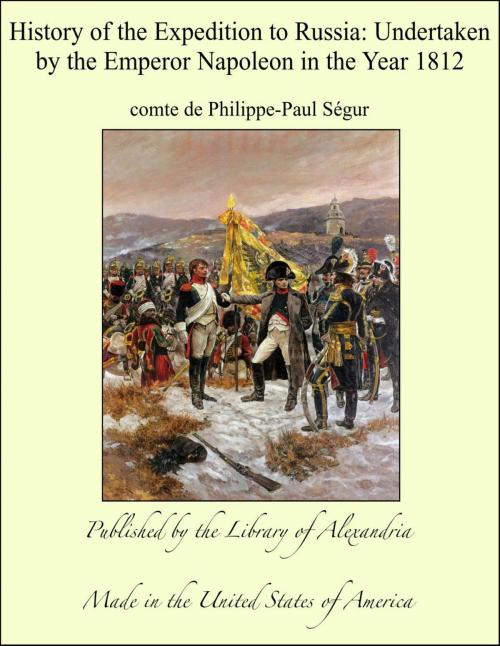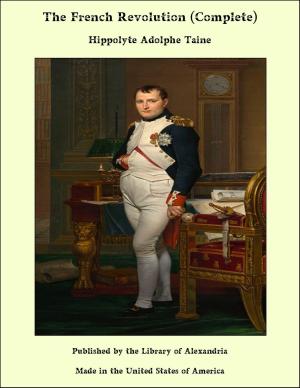History of the Expedition to Russia: Undertaken by the Emperor Napoleon in the Year 1812
Nonfiction, Religion & Spirituality, New Age, History, Fiction & Literature| Author: | comte de Philippe-Paul Ségur | ISBN: | 9781465574589 |
| Publisher: | Library of Alexandria | Publication: | March 8, 2015 |
| Imprint: | Language: | English |
| Author: | comte de Philippe-Paul Ségur |
| ISBN: | 9781465574589 |
| Publisher: | Library of Alexandria |
| Publication: | March 8, 2015 |
| Imprint: | |
| Language: | English |
Ever since 1807, when the space between the Rhine and the Niemen had been overrun, the two great empires of which these rivers were the boundaries had become rivals. By his concessions at Tilsit, at the expense of Prussia, Sweden, and Turkey, Napoleon had only satisfied Alexander. That treaty was the result of the defeat of Russia, and the date of her submission to the continental system. Among the Russians, it was regarded by some as attacking their honour; and by all it was felt to be ruinous to their interests. By the continental system Napoleon had declared eternal war against the English; to that system he attached his honour, his political existence, and that of the nation under his sway. That system banished from the Continent all merchandise which was English, or had paid duty in any shape to England. He could not succeed in establishing it but by the unanimous consent of the continental nations, and that consent could not be hoped for but under a single and universal dominion. France had besides alienated the nations of Europe from her by her conquests, and the monarchs by her revolution and her new dynasty. Henceforward she could no longer look forward to have either friends or rivals, but merely subjects; for the first would have been false, and the second implacable: it followed that all must be subject to her, or she to all. With feelings of this kind, her leader, influenced by his position, and urged on by his enterprising character, filled his imagination with the vast project of becoming the sole master of Europe, by overwhelming Russia, and wresting Poland from her dominion. He had so much difficulty in concealing this project, that hints of it began to escape him in all directions. The immense preparations which so distant an enterprise required, the enormous quantities of provisions and ammunition collecting, the noise of arms, of carriages, and the march of such numbers of soldiers—the universal movement the majestic and terrible course of all the forces of the West against the East—every thing announced to Europe that her two colossuses were about to measure their strength with each other.
Ever since 1807, when the space between the Rhine and the Niemen had been overrun, the two great empires of which these rivers were the boundaries had become rivals. By his concessions at Tilsit, at the expense of Prussia, Sweden, and Turkey, Napoleon had only satisfied Alexander. That treaty was the result of the defeat of Russia, and the date of her submission to the continental system. Among the Russians, it was regarded by some as attacking their honour; and by all it was felt to be ruinous to their interests. By the continental system Napoleon had declared eternal war against the English; to that system he attached his honour, his political existence, and that of the nation under his sway. That system banished from the Continent all merchandise which was English, or had paid duty in any shape to England. He could not succeed in establishing it but by the unanimous consent of the continental nations, and that consent could not be hoped for but under a single and universal dominion. France had besides alienated the nations of Europe from her by her conquests, and the monarchs by her revolution and her new dynasty. Henceforward she could no longer look forward to have either friends or rivals, but merely subjects; for the first would have been false, and the second implacable: it followed that all must be subject to her, or she to all. With feelings of this kind, her leader, influenced by his position, and urged on by his enterprising character, filled his imagination with the vast project of becoming the sole master of Europe, by overwhelming Russia, and wresting Poland from her dominion. He had so much difficulty in concealing this project, that hints of it began to escape him in all directions. The immense preparations which so distant an enterprise required, the enormous quantities of provisions and ammunition collecting, the noise of arms, of carriages, and the march of such numbers of soldiers—the universal movement the majestic and terrible course of all the forces of the West against the East—every thing announced to Europe that her two colossuses were about to measure their strength with each other.















